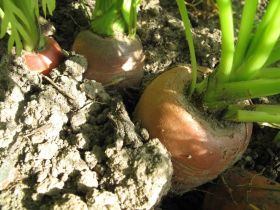Carrots
The carrot is one of the most popular vegetables. While is can take ages for seed to germinate and is plagued by some persistent pests, it is still relatively easy to grow carrots in the home garden or allotment. While most carrots are orange, they also come in white, red, yellow or purple. Why not try a different variety?
How to sow carrots
Carrots can be sown every couple of weeks for a year round crop, though winter sowings will need some protection. They like a light, stone free soil and can be grown either in the ground or in containers. Carrots will be ready to pull around 12-16 weeks after sowing and should be protected against frost.
Sow carrot seed thinly into rows. It can be a good idea to mix a few radish seeds in with carrot seeds. They will germinate far more quickly than carrots, which can take several weeks to sprout and therefore mark where the rows will be. The radishes can be pulled and eaten long before the carrots need the space. Thin young carrots to avoid overcrowding. You can eat the baby carrots.
How to water carrots
Do not over-water, though keep seedlings moist. Carrots like hot weather and are fairly drought resistant. Though you should always make sure that carrots do not become overcrowded – weed carrot beds by hand to remove carrot's competition. One of the main problems for carrots is the pesky carrot fly, whose larvae will eat your carrots. One you have them there is nothing you can do to get rid of them so all you can do is try to limit the chance of them finding your carrots to begin with. You can enmesh your carrots, or plant alongside onions or another member of the allium family so flies are not immediately able to detect the scent of your carrots, and minimise crushing of the carrots' foliage while weeding so a stronger carrot smell is not released. As with many plants, carrots can attract aphids. Planting flowers and herbs nearby to attract beneficial aphid predators like ladybirds will help prevent infestations. As carrot crowns push up through the soil, cover them with soil to prevent them from becoming green and bitter.
Do not worry too much if your carrots are forked. This is usually just because they have hit a stone or another obstacle. They may not look like shop-bought carrots but will taste just the same – actually rather better!
Home grown carrots are satisfying and delicious. Eating a carrot fresh from your garden it will taste so much better than one bought from the supermarket. Organically grown carrots are particularly healthy.
Carrots companion planting
Carrots are a good companion for leeks or onions. The leeks and onions deter carrot fly and the carrots also deter onion fly and leek moth. Carrots are also said to be beneficial to tomatoes, helping them grow better, though the carrots' growth may be stunted somewhat. There is some evidence that suggests that inter-cropping of carrots and lettuce helps both crops.
